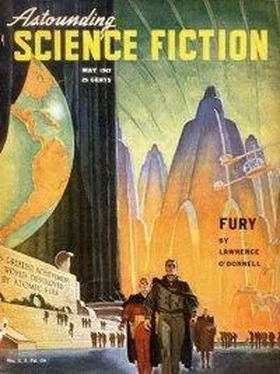Thomas Sherred - E for Effort
Здесь есть возможность читать онлайн «Thomas Sherred - E for Effort» весь текст электронной книги совершенно бесплатно (целиком полную версию без сокращений). В некоторых случаях можно слушать аудио, скачать через торрент в формате fb2 и присутствует краткое содержание. Год выпуска: 1947, Издательство: Street & Smith Publications, Inc., Жанр: Фантастика и фэнтези, на английском языке. Описание произведения, (предисловие) а так же отзывы посетителей доступны на портале библиотеки ЛибКат.
- Название:E for Effort
- Автор:
- Издательство:Street & Smith Publications, Inc.
- Жанр:
- Год:1947
- ISBN:нет данных
- Рейтинг книги:3 / 5. Голосов: 1
-
Избранное:Добавить в избранное
- Отзывы:
-
Ваша оценка:
- 60
- 1
- 2
- 3
- 4
- 5
E for Effort: краткое содержание, описание и аннотация
Предлагаем к чтению аннотацию, описание, краткое содержание или предисловие (зависит от того, что написал сам автор книги «E for Effort»). Если вы не нашли необходимую информацию о книге — напишите в комментариях, мы постараемся отыскать её.
E for Effort — читать онлайн бесплатно полную книгу (весь текст) целиком
Ниже представлен текст книги, разбитый по страницам. Система сохранения места последней прочитанной страницы, позволяет с удобством читать онлайн бесплатно книгу «E for Effort», без необходимости каждый раз заново искать на чём Вы остановились. Поставьте закладку, и сможете в любой момент перейти на страницу, на которой закончили чтение.
Интервал:
Закладка:
E for Effort
by T.L. Sherred
The captain was met at the airport by a staff car. Long and fast it sped. In a narrow, silent room the general sat, ramrod-backed, tense. The major waited at the foot of the gleaming steps shining frostily in the night air. Tires screamed to a stop and together the captain and the major raced up the steps. No words of greeting were spoken. The general stood quickly, hand outstretched. The captain ripped open a dispatch case and handed over a thick bundle of papers. The general flipped them over eagerly and spat a sentence at the major. The major disappeared and his harsh voice rang curtly down the outside hall. The man with glasses came in and the general handed him the papers. With jerky fingers the man with glasses sorted them out. With a wave from the general the captain left, a proud smile on his weary young face. The general tapped his fingertips on the black glossy surface of the table. The man with glasses pushed aside crinkled maps, and began to read aloud.
Dear Joe:
I started this just to kill time, because I got tired of just looking out the window. But when I got almost to the end I began to catch the trend of what’s going on. You’re the only one I know that can come through for me, and when you finish this you’ll know why you must. I don’t know who will get this to you. Whoever it is won’t want you to identify a face later. Remember that, and please, Joe— hurry!
EdIt all started because I’m lazy. By the time I’d shaken off the sandman and checked out of the hotel every seat in the bus was full. I stuck my bag in a dime locker and went out to kill the hour I had until the bus left. You know the bus terminal: right across from the Book-Cadillac and the Statler, on Washington Boulevard near Michigan Avenue. Michigan Avenue. Like Main in Los Angeles, or maybe Sixty-third in its present state of decay in Chicago, where I was going. Cheap movies, pawnshops and bars by the dozens, a penny arcade or two, restaurants that feature hamburg steak, bread and butter and coffee for forty cents. Before the War, a quarter.
I like pawnshops. I like cameras, I like tools, I like to look in windows crammed with everything from electric razors to sets of socket wrenches to upper plates. So, with an hour to spare, I walked out Michigan to Sixth and back on the other side of the street. There are a lot of Chinese and Mexicans around that part of town, the Chinese running the restaurants and the Mexicans eating Southern Home Cooking. Between Fourth and Fifth, I stopped to stare at what passed for a movie. Store windows painted black, amateurish signs extolling in Spanish “Detroit premiere… cast of thousands… this week only … ten cents—” The few 8X10 glossy stills pasted on the windows were poor blowups, spotty and wrinkled; pictures of mailed cavalry and what looked like a good-sized battle. All for ten cents. Right down my alley.
Maybe it’s lucky that history was my major in school. Luck it must have been, certainly not cleverness, that made me pay a dime for a seat in an undertaker’s rickety folding chair imbedded solidly—although the only other customers were a half-dozen Sons of the Order of Tortilla—in a cast of second-hand garlic. I sat near the door. A couple of hundred watt bulbs dangling naked from the ceiling gave enough light for me to look around. In front of me, in the rear of the store, was the screen, what looked like a white-painted sheet of beaverboard, and when over my shoulder I saw the battered sixteen millimeter projector I began to think that even a dime was no bargain. Still, I had forty minutes to wait.
Everyone was smoking. I lit a cigarette and the discouraged Mexican who had taken my dime locked the door and turned off the lights, after giving me a long, questioning look. I’d paid my dime, so I looked right back. In a minute the old projector started clattering. No film credits, no producer’s name, no director, just a tentative flicker before a closeup of a bewhiskered mug labeled Cortez. Then a painted and feathered Indian with the title of Guatemotzin, successor to Montezuma; an aerial shot of a beautiful job of model-building tagged Ciudad de Mejico, 1521. Shots of old muzzle-loaded artillery banging away, great walls spurting stone splinters under direct fire, skinny Indians dying violently with the customary gyrations, smoke and haze and blood. The photography sat me right up straight. It had none of the scratches and erratic cuts that characterize an old print, none of the fuzziness, none of the usual mugging at the camera by the handsome hero. There wasn’t any handsome hero. Did you ever see one of these French pictures, or a Russian, and comment on the reality and depth brought out by working on a small budget that can’t afford famed actors? This, what there was of it, was as good, or better.
It wasn’t until the picture ended with a pan shot of a dreary desolation that I began to add two and two. You can’t, for pennies, really have a cast of thousands, or sets big enough to fill Central Park. A mock-up, even, of a thirty-foot fall costs enough to irritate the auditors, and there had been a lot of wall. That didn’t fit with the bad editing and lack of sound track, not unless the picture had been made in the old silent days. And I knew it hadn’t by the color tones you get with pan film. It looked like a well-rehearsed and badly-planned news-reel.
The Mexicans were easing out and I followed them to where the discouraged one was rewinding the reel. I asked him where he got the print.
“I haven’t heard of any epics from the press agents lately, and it looks like a fairly recent print.”
He agreed that it was recent, and added that he’d made it himself. I was polite to that, and he saw that I didn’t believe him and straightened up from the projector.
“You don’t believe that, do you?” I said that I certainly did, and I had to catch a bus. “Would you mind telling me why, exactly why?” I said that the bus— “I mean it. I’d appreciate it if you’d tell me just what’s wrong with it.”
“There’s nothing wrong with it,” I told him. He waited for me to go on. “Well, for one thing, pictures like that aren’t made for the sixteen millimeter trade. You’ve got a reduction from a thirty-five millimeter master,” and I gave him a few of the other reasons that separate home movies from Hollywood. When I finished he smoked quietly for a minute.
“I see.” He took the reel off the projector spindle and closed the case. “I have beer in the back.” I agreed beer sounded good, but the bus—well, just one. From in back of the beaverboard screen he brought paper cups and a jumbo bottle. With a whimsical “Business suspended” he closed the open door and opened the bottle with an opener screwed on the wall. The store had likely been a grocery or restaurant. There were plenty of chairs. Two we shoved around and relaxed companionably. The beer was warm.
“You know something about this line,” tentatively.
I took it as a question and laughed, “Not too much. Here’s mud,” and we drank. “Used to drive a truck for the Film Exchange.” He was amused at that.
“Stranger in town?”
“Yes and no. Mostly yes. Sinus trouble chased me out and relatives bring me back. Not any more, though; my father’s funeral was last week.” He said that was too bad, and I said it wasn’t. “He had sinus, too.” That was a joke, and he refilled the cups. We talked awhile about Detroit climate.
Finally he said, rather speculatively, “Didn’t I see you around here last night? Just about eight.” He got up and went after more beer.
I called after him. “No more beer for me.” He brought a bottle anyway, and I looked at my watch. “Well, just one.”
“Was it you?”
“Was it me what?” I held out my paper cup.
Читать дальшеИнтервал:
Закладка:
Похожие книги на «E for Effort»
Представляем Вашему вниманию похожие книги на «E for Effort» списком для выбора. Мы отобрали схожую по названию и смыслу литературу в надежде предоставить читателям больше вариантов отыскать новые, интересные, ещё непрочитанные произведения.
Обсуждение, отзывы о книге «E for Effort» и просто собственные мнения читателей. Оставьте ваши комментарии, напишите, что Вы думаете о произведении, его смысле или главных героях. Укажите что конкретно понравилось, а что нет, и почему Вы так считаете.












